Biz and Tech Podcasts > Business > The Far Middle
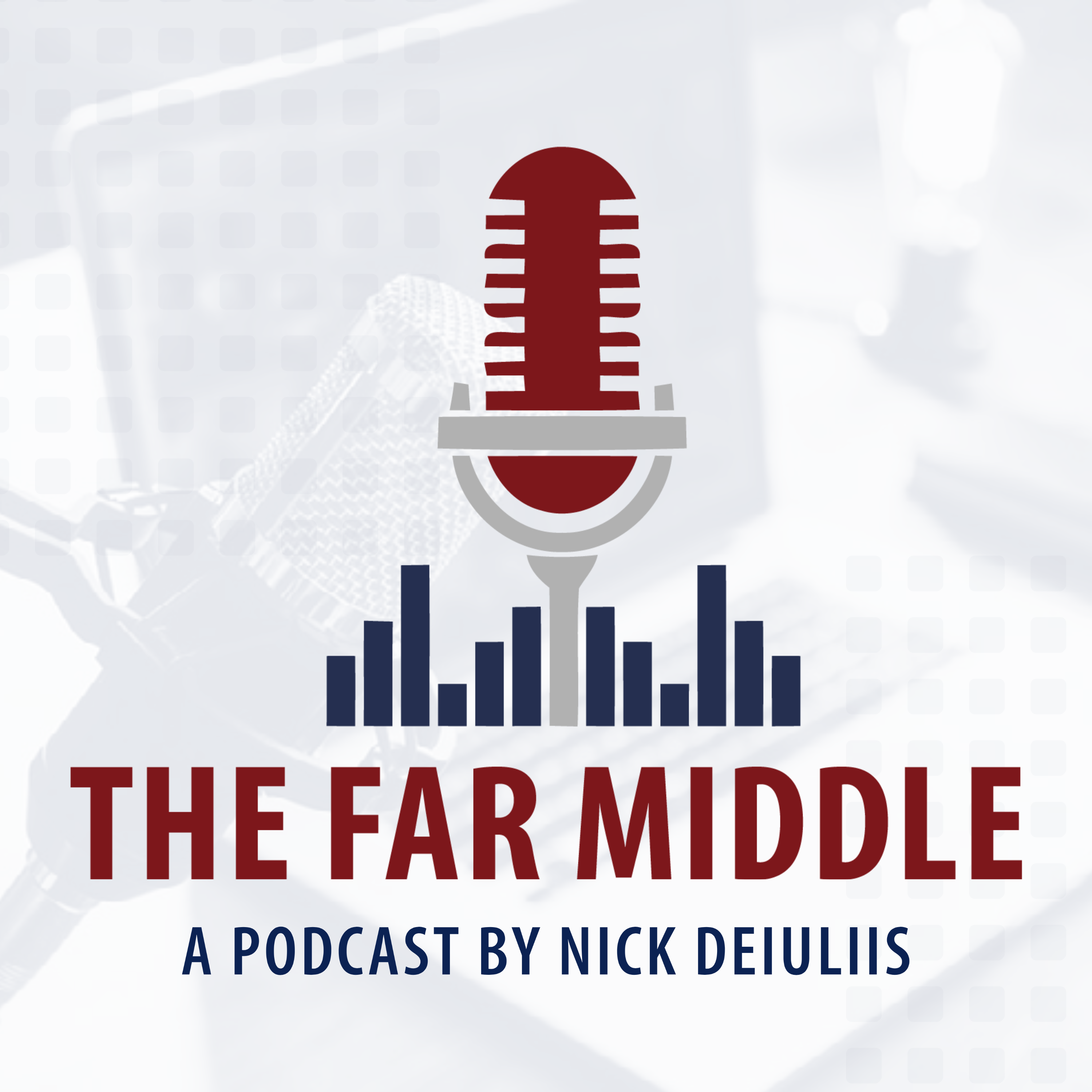
Tune in weekly to Nick’s Far Middle Podcast, covering a range of timely and interesting topics spanning business, energy, sports, culture, politics, and policy. Each installment of the Far Middle podcast offers an entertaining stroll through a variety of subjects that Nick ties together in a common theme at episode’s end. Never predictable, but always engaging, the Far Middle is a must-listen for those looking for straight talk in a world of facade.
Last Episode Date: 20 November 2024
Total Episodes: 183
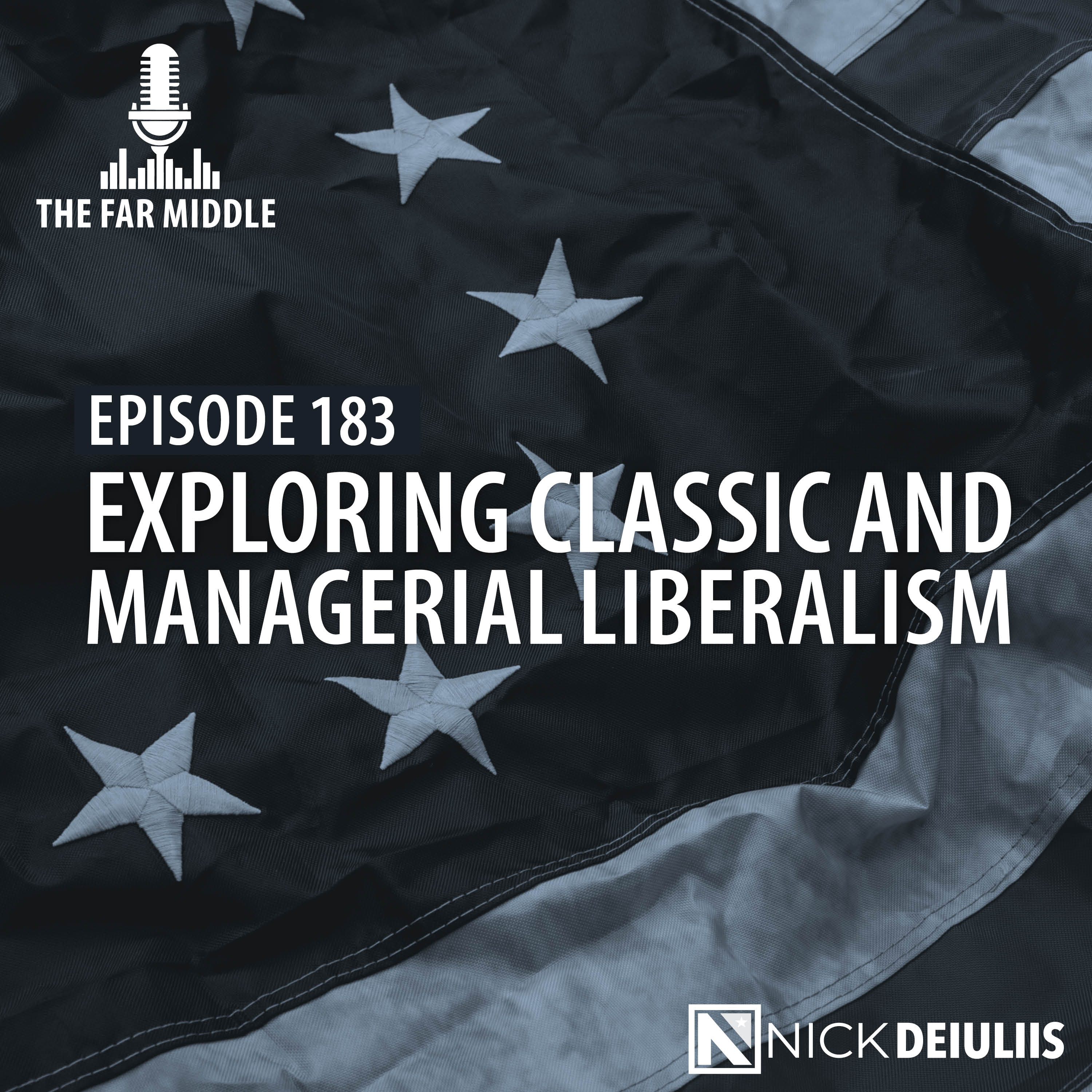
In another engaging Far Middle installment, Nick takes “constant listeners” on a journey through American football history and political philosophy. George "Papa Bear" Halas, a titan of professional football whose influence extended far beyond the gridiron, is honored with episode 183’s sports dedication. Born in 1895, Halas lived a remarkable life that spanned nearly nine decades. He was not only a professional football player, coach, and executive but also the founder and owner of the Chicago Bears. Halas's contributions to the sport were immense, including co-founding the NFL's predecessor in 1920 and introducing numerous innovations such as daily team practices, film analysis of opponents, and radio game broadcasts. His legacy in football is unparalleled, with 63 years as an owner, 40 as a coach, 324 wins, and eight NFL titles. But Halas was more than just a football legend. He briefly played for the New York Yankees, earned a civil engineering degree from Illinois, and served in the Navy during World War I, where he was named MVP of the 1919 Rose Bowl (that’s right, the 1919 Rose Bowl was played between the Mare Island Marines and the Great Lakes Navy). Halas’ life story embodies the potential of America and serves as a fitting dedication for the episode, which then takes a turn to explore the complexities of American political philosophy. Nick explains the discussion is inspired by Matt Wolfson's recent essay, "Two Forms of American Liberalism." Nick challenges the oversimplified binary view of conservative versus liberal, arguing for a more nuanced understanding of political ideologies. He distinguishes between progressivism, libertarianism, classic liberalism, conservatism, and leftism, emphasizing the significant differences between being liberal and being leftist. Delving deeper, Nick examines Wolfson's two categories of liberalism: classic and managerial. Classic liberalism advocates for representative government strengthened by associations close to people, free markets with limited government intervention, and non-interventionism in foreign policy. In contrast, managerial liberalism promotes centralized government and large institutions, relying on expert administrators, academia, and judges for policymaking. Nick traces the evolution of these two forms of liberalism throughout American history, from the early debates between James Madison and Alexander Hamilton to the shifts that occurred during the New Deal and post-World War II era. “Somewhere between the Great Depression and Lyndon Johnson's policies, between say 1930 and 1970, managerial liberalism superseded classic liberalism, and managerial liberalism now dominates American politics and policy,” says Nick. The result has been an erosion of free speech, inconsistent respect for property rights, and expansion of bureaucratic control. Nick emphasizes the need for classic liberalism to regain a stronger footing in America. And, in closing, connects order to political philosophies with Dmitri Mendeleev's creation of the periodic table in chemistry, highlighting the importance of clarity and organization in understanding complex systems. Far Middle Connections: The November 20th premiere date of episode 183 coincides with the passing of Russian author Leo Tolstoy over a century ago, on November 20, 1910. Revisit the close of episode 181 for Nick’s reflection on Tolstoy’s short story “How Much Land Does a Man Need?”
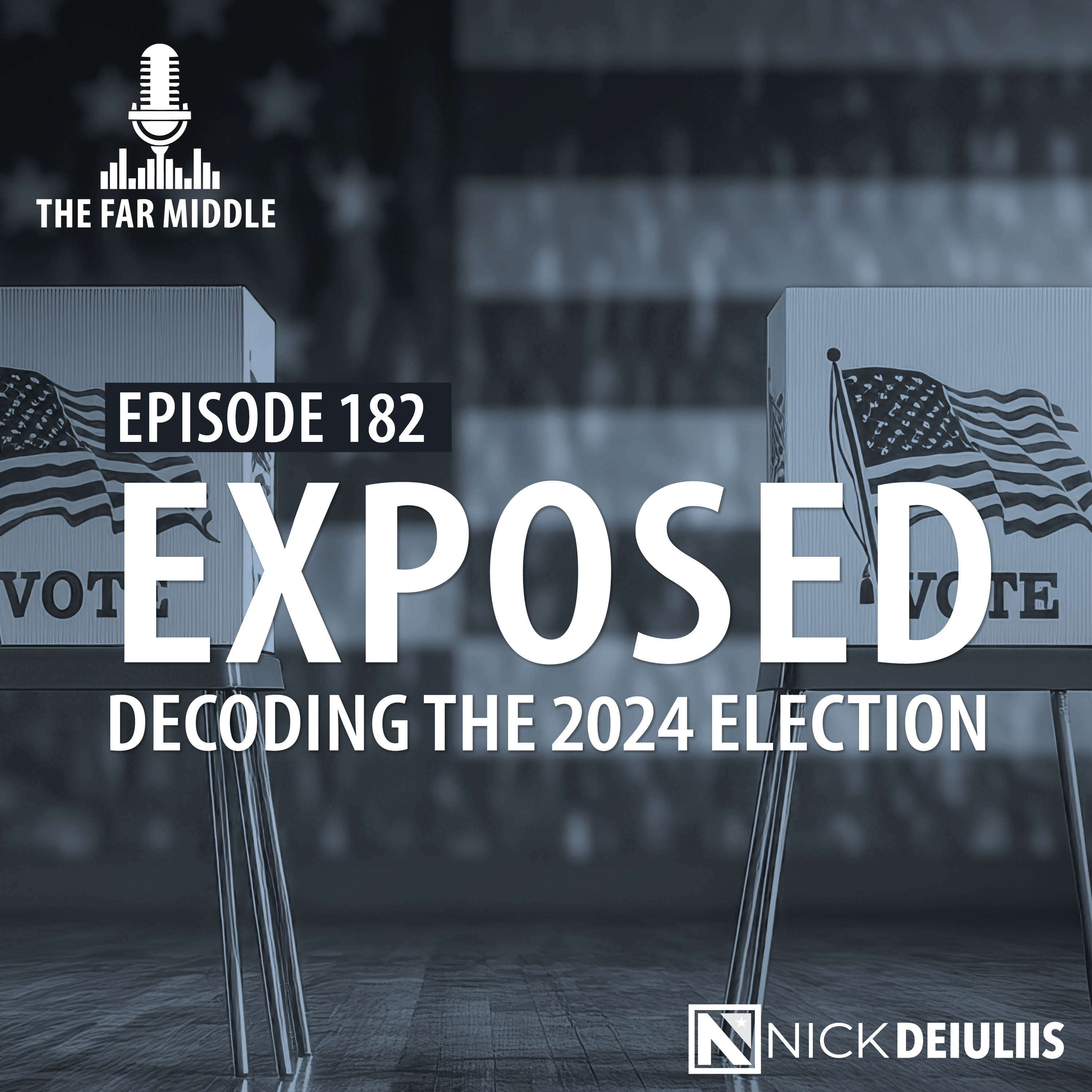
In Far Middle episode 182, Nick presents an unconventional analysis of the 2024 presidential election. Before assessing the lessons from the 2024 election, Nick begins with a fitting sports dedication. That tribute goes to President Gerald Ford as Nick highlights not only Ford's athletic career at the University of Michigan (helping lead the Wolverines to two national championships), but also Ford’s service in the Navy and the South Pacific during World War II. “A single word sums up everything we've been subjected to, that we've observed, that we thought, and that we've experienced in the 2024 presidential race. And that single word that captures it all, from message to theme, exposed,” says Nick as he proceeds to decode the takeaways from this year’s presidential race. Nick argues that the 2024 election exposed various truths, fictions, strengths, and weaknesses of the candidates and the political landscape. And ultimately the election was a choice between Trump and anti-Trump, or between viewing the country as on the right track versus the wrong track. Assessing Donald Trump and Kamala Harris, Nick details the nominees’ strengths and weaknesses and how they were exposed throughout the campaign. In addition to the candidates, Nick comments on a “slew of false fictions” that were also exposed. Those include the notion that Trump's support was limited to white Americans, the influence (or lack thereof) of Hollywood celebrities, the idea that early mail-in voting favors Democrats, and the reliability of mainstream media and pollsters. “The election exposed that the party with the most diverse coalition this time around was the Republicans, not the Democrats, which is fascinating. And I think it'll be fascinating to see how that evolves over time,” says Nick. The election revealed new voter demographics, suggesting that the electorate is now more divided along economic lines (paycheck-to-paycheck voters vs. affluent elite voters) rather than traditional racial or gender lines. Nick closes by connecting back to one of the episode’s earlier mentioned celebrities, Robert De Niro, for a brief discussion of the classic film Raging Bull, as the episode's November 13 release date coincides with Raging Bull’s 1980 premiere in New York City.
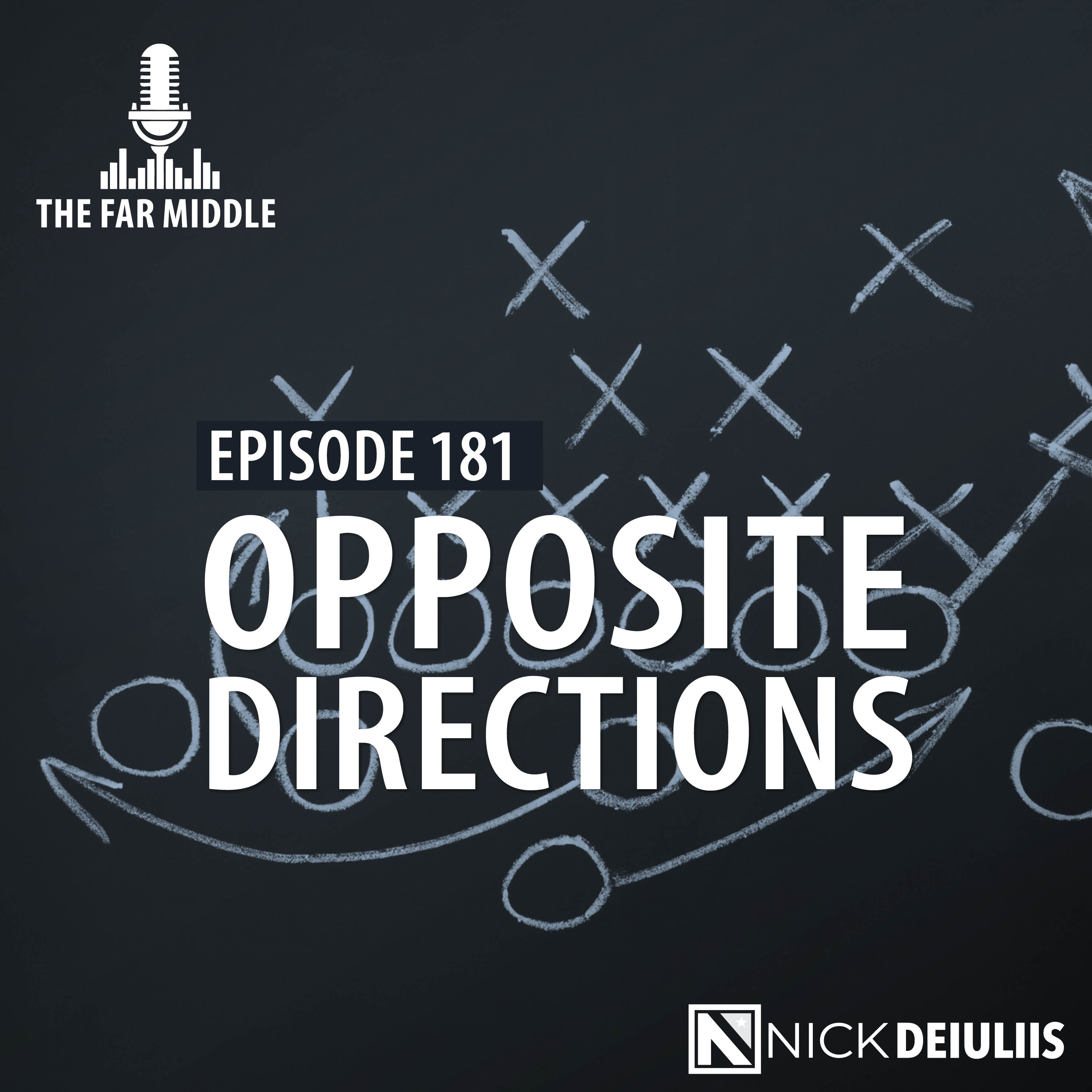
Far Middle episode 181 arrives the day after the 2024 General Election.“Election Day is about as American as you can get, and we are in the middle of a great football season, which is another thing that is about as American as you can get,” begins Nick. Accordingly, Nick pays homage to “Captain America,” better known as legendary NFL quarterback Roger Staubach for the installment’s sports dedication.Recounting Staubach’s impressive career, Nick looks back on his college days at the U.S. Naval Academy, his subsequent service in the Navy, and his success with the Dallas Cowboys. Staubach's achievements include winning the Heisman Trophy, serving in the Vietnam War, leading the Cowboys to five Super Bowl appearances and two victories, building a successful real estate business, and much more.Transitioning from Staubach's story, Nick begins the episode’s string of connections, starting by spotlighting a recent Government Accountability Office report that estimated $236 billion in improper payments last year. For perspective, Nick notes that figure is more than six times the Department of Justice's annual budget.From wasteful spending of federal tax dollars, Nick connects to wasteful spending of state tax dollars in California. The Golden State has spent $24 billion over the last five years to address homelessness. Despite those billions spent, California's homeless population has grown by roughly 20 percent over the past five years. And further, 30 percent of the nation's homeless population today is now found in California.“California's multi-billion-dollar homelessness industrial complex has had the opposite effect, that of catalyzing an ever-growing population of homeless,” says Nick. “And that homelessness industrial complex, it consists of nine state agencies and more than 30 individual programs. It is massive, complex and expensive. But we can't say that it's effective. It may be making the problem worse.”Next up, the “Fauci Focus” finds a home once again on the Far Middle. The segment returns as Nick calls out testimony from Dr. Fauci where he stated that the 6-foot distancing rule “sort of just appeared.” And Nick also addresses Dr. Fauci’s statements that he didn’t recall any supporting evidence for masking children.Moving abroad, Nick discusses a case involving Swiss women and the European Court of Human Rights, “yes there is such a thing,” affirms Nick. The court agreed with the women's claim that Switzerland was a human rights abuser due to inaction on climate change. The case “shows the danger of handing over delegating authority from a sovereign nation to an international or multinational organization like the EU and its kangaroo courts.”The episode’s connections connect to “a very underrated and underappreciated economist by the name of Vernon L. Smith,” says Nick. Smith is considered the founder of experimental economics. Nick discusses Smith’s views on inflation and printing money to pay government debts, as well as the importance of raising the value of work to help the poor, contrasting with current trends in America.“The way to raise the value of people's work is to get government and the bureaucrat out of the way of the private sector,” says Nick. “And the way to deal with budget deficits and government debt is to rein in spending and balance budgets, not to print more money. What worries me and what should worry you is that the trends we're seeing today in America are in the two opposite directions.”Returning to the topic of elections, Nick compares recent elections in Mexico and India, and how Western media is misrepresenting the democratic trends in both countries. While Leftist policies proliferate and checks and balances erode in Mexico, India is demonstrating its democratic strength despite its imperfections.In closing, Nick discusses Leo Tolstoy...
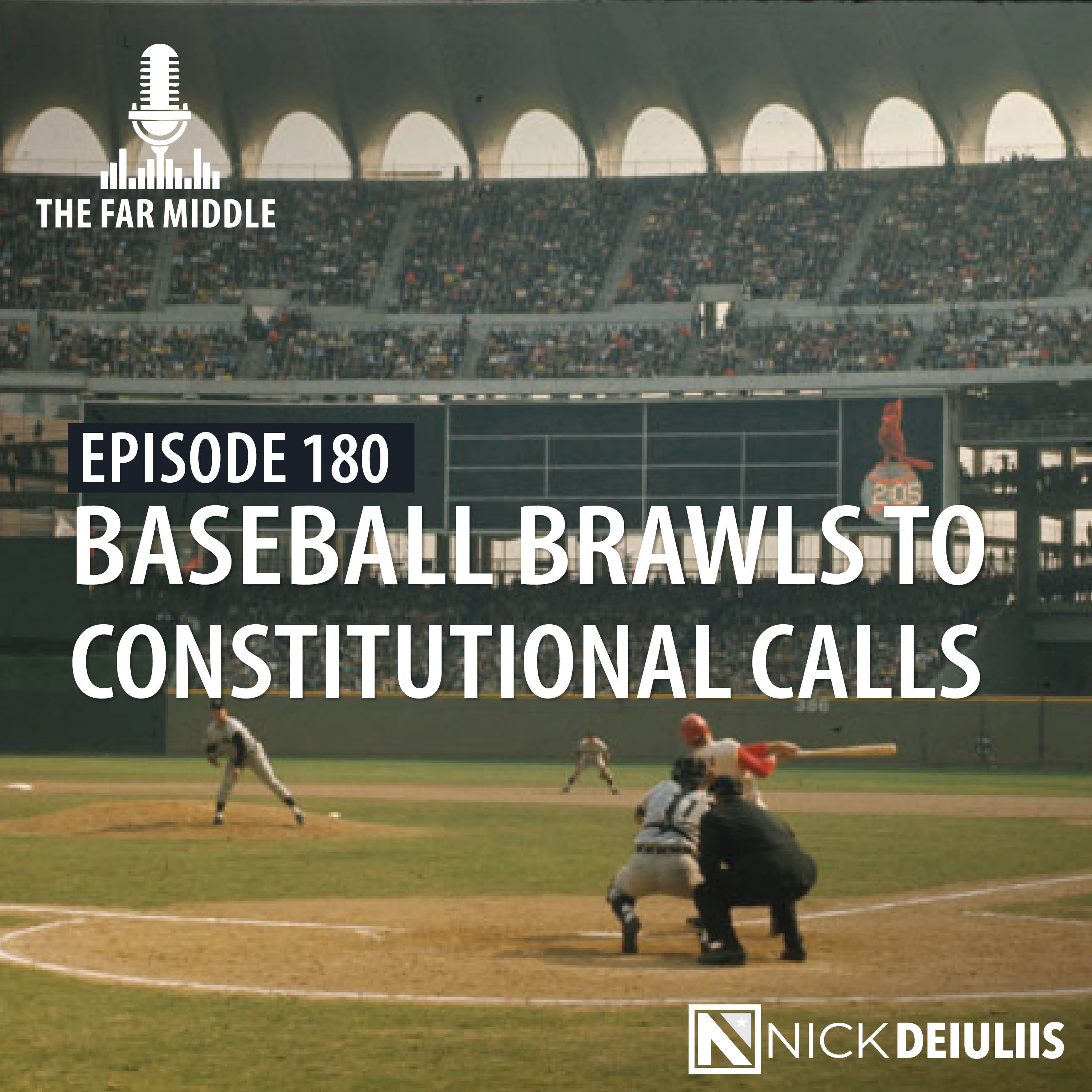
In Far Middle episode 180, Nick highlights a one-of-a-kind baseball brawl from his favorite era, the 1970s, for the installment’s sports dedication. The incident between Hall of Famer Ted Simmons, pitcher Al Hrabosky, hitter Bill Madlock, and their Cardinals and Cubs teammates in 1974 was a memorable altercation, but also one of which many fans may be unaware. Listen as Nick recounts the wild events that took place in St. Louis just over 50 years ago. Delving into more serious issues, Nick explains the episode's theme. He describes it as “standards and rule of law, meeting those standards – or falling short – getting rule of law right or getting it wrong, and then second chances to get things back on course." With that synopsis, Nick begins a critique of the Secret Service, highlighting several recent failures and historical lapses in security protocols. Drawing parallels between these failures and broader governance issues, Nick questions the influence of unelected individuals like First Lady Jill Biden on executive decisions. He emphasizes the importance of adhering to constitutional norms and protocols for succession of power. Nick stresses that he has no opposition to the important role of first ladies or first gentlemen, but rather highlights that they are not elected by the voters to be or to act as president. “If the president is unable to perform the duty of office, there are pretty clear protocols in place that lay out what needs to be done in the interim until another election,” says Nick. “It doesn't say in any of those protocols that first lady or first gentleman assumes the responsibilities of their elected spouse.” Connecting from the rules relating to the succession of power in the executive branch, Nick then discusses the rules pertaining to America’s legal system and warns of the dangers of lawfare. Nick calls for a consistent legal system based on established rules that apply universally and are clearly defined. He criticizes the Chevron deference, which granted excessive power to bureaucrats, and praises its recent overturn by the Supreme Court in the Loper-Bright decision, providing a return to constitutional balance among the branches of government and “a return to sound government and rule of law.” In closing, Nick recounts Ricky Nelson's career transformation from a teen idol to a country-rock artist. He discusses Nelson's hit song "Garden Party," inspired by an incident at Madison Square Garden where Nelson was booed for playing new material instead of his old hits. The song's lyrics reflect Nelson's realization about staying true to oneself despite public opinion.
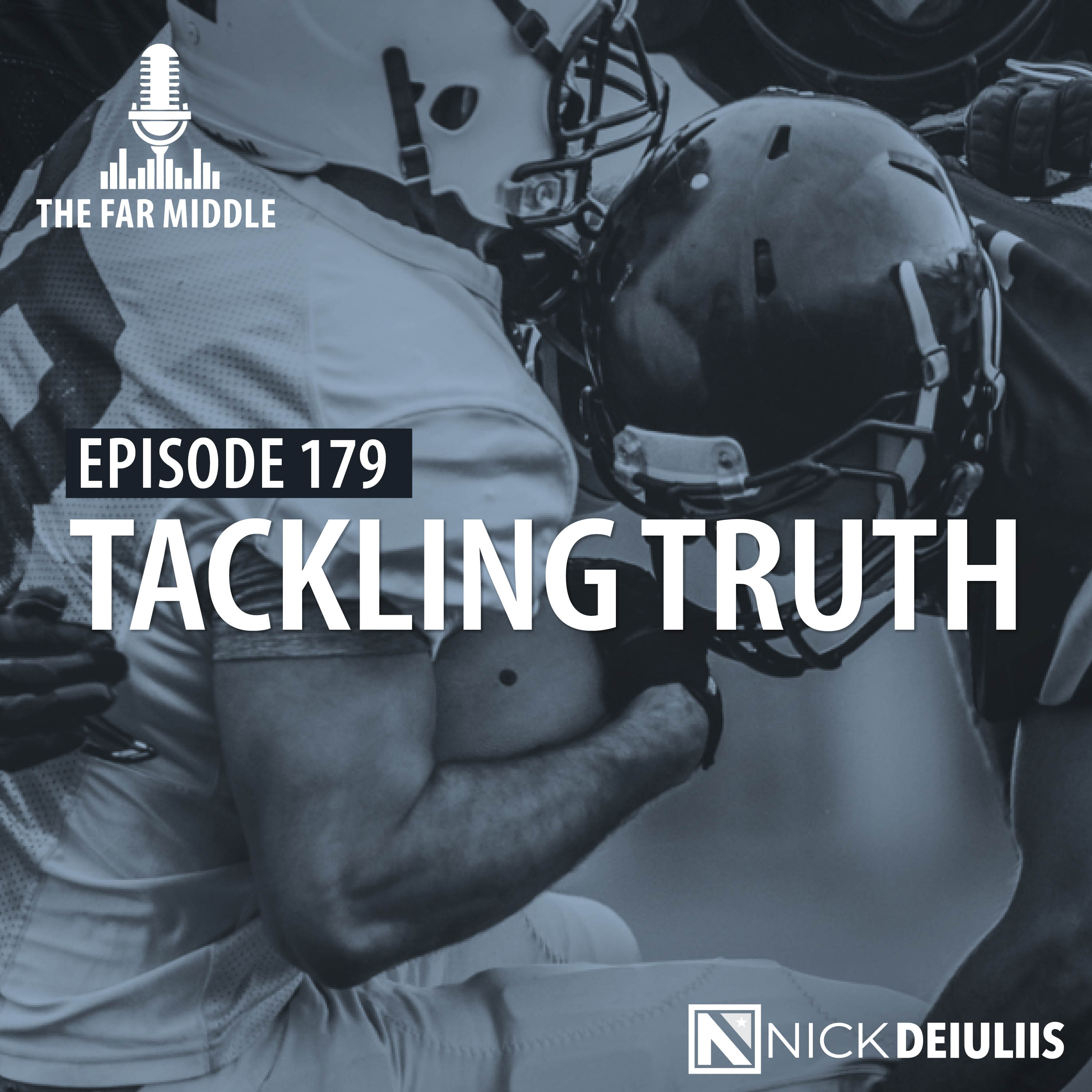
Far Middle episode 179 honors the one and only Chuck Bednarik. Not only does Bednarik join a long list of football legends celebrated on the Far Middle, but he joins a distinguished class of Far Middle sports legends who also served in our military, such as Ted Williams, Joe DiMaggio, Bob Feller, and Pat Tillman. Nick looks back on “Concrete Charlie’s” Depression-era childhood in Bethlehem, Pennsylvania, his service as a B-24 bomber gunner in World War II, and his subsequent rise as a dual-threat college football player at the University of Pennsylvania. Bednarik was selected first overall in the 1949 NFL Draft by the Eagles and became known for his fierce defensive play, contributing to two NFL championships. Nick highlights Bednarik's infamous moments on the field, including his iconic tackle of Frank Gifford that left Gifford unconscious and led to lasting notoriety. Describing Bednarik as versatile and outspoken, Nick transitions from sports to literature to highlight the versatile and outspoken writer George Orwell, “one of my top three favorite writers of all time.” Nick delves into Orwell's non-fiction political essays, examining how they contrast democracy with fascism and totalitarianism. Topics include media control, the manipulation of truth, and the dangers of totalitarian regimes. Nick links these ideas to contemporary political and societal issues. As evidence of the media’s impact on public perception, Nick explores Orwell's analysis of the panic caused by Orson Welles' "War of the Worlds" broadcast. It’s another one-of-a-kind Far Middle as Nick tackles truth and the hard-hitting pair of Chuck Bednarik and George Orwell.
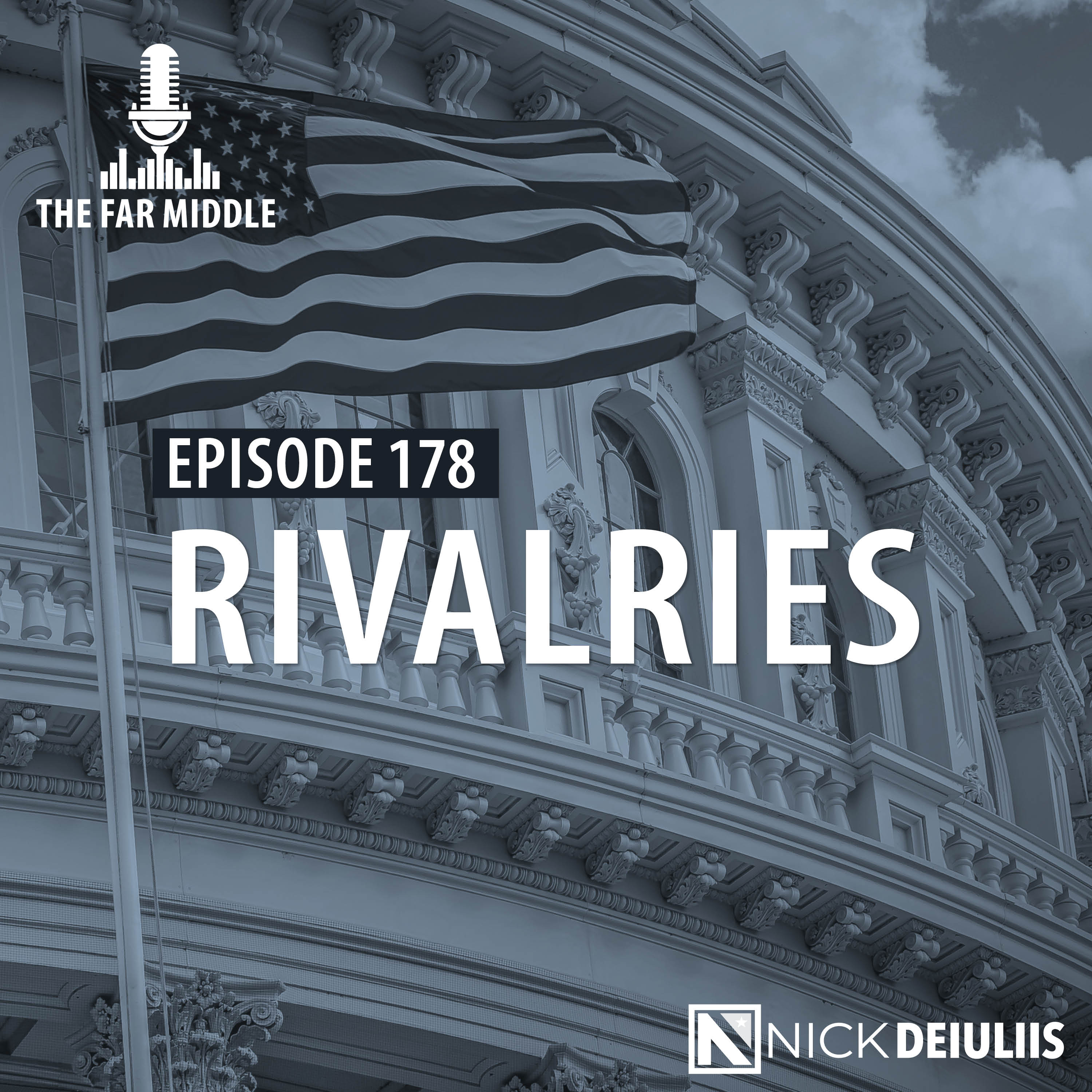
In Far Middle episode 178, Nick begins with a reflection on Christopher Columbus following the recent Columbus Day holiday, noting its significance for Italian Americans. Next, Nick recalls a trifecta of iconic and dramatic sports moments for the installment’s sports dedication. These baseball and hockey classics may not have been championship-winning games, but they’re often remembered as such. Starting at Fenway Park, Nick remembers Game 6 of the 1975 World Series. He then recalls the "Miracle on Ice" at the 1980 Lake Placid Olympics, and then shifts six years later and 300 miles south to Shea Stadium for Game 6 of the 1986 World Series. Moving from rivalries in sports to rivalries in major American political parties and philosophies, Nick delves into the current state of American conservatism. Acknowledging the work of the Hudson Institute’s John Fonte, Nick analyzes the competing conservative views between National Conservatives and Freedom Conservatives. These groups represent different "waves" of conservative thought, with Freedom Conservatives representing the "second wave” and National Conservatives associated with the "third wave.” Nick reviews the key differences between these groups, including their views on globalization, immigration, and the role of government in cultural issues. “What National Conservatives and Freedom Conservatives all agree upon, and for that matter classic or traditional Liberals and Libertarians like myself, is an affirmation of the idea of America as something special,” says Nick. “That they all agree on, even though they seem to disagree on everything else. The Left however, it views America as in need of a revolutionary transformation because it views America and its history as deeply problematic.” From Conservatism and classic Liberalism and Libertarianism, Nick explores the economic philosophy of Friedrich Hayek and his influential book "The Road to Serfdom," drawing connections between Hayek's ideas and current Conservative movements. After reaffirming the dangers of state control and intervention into free markets and individual rights, Nick assesses the latest on America’s financial and employment situation—a recurring, albeit sobering, Far Middle topic. In closing, Nick concludes with a tribute to Pope John Paul II on the anniversary of his election as pope. Nick shares several interesting facts about the pontiff, including his prolific writing, extensive travels, and his role in opposing communism in Poland. For more on the “Miracle on Ice,” revisit the intro to Far Middle episode 80, “Welcome to the No-Growth Hotel.”
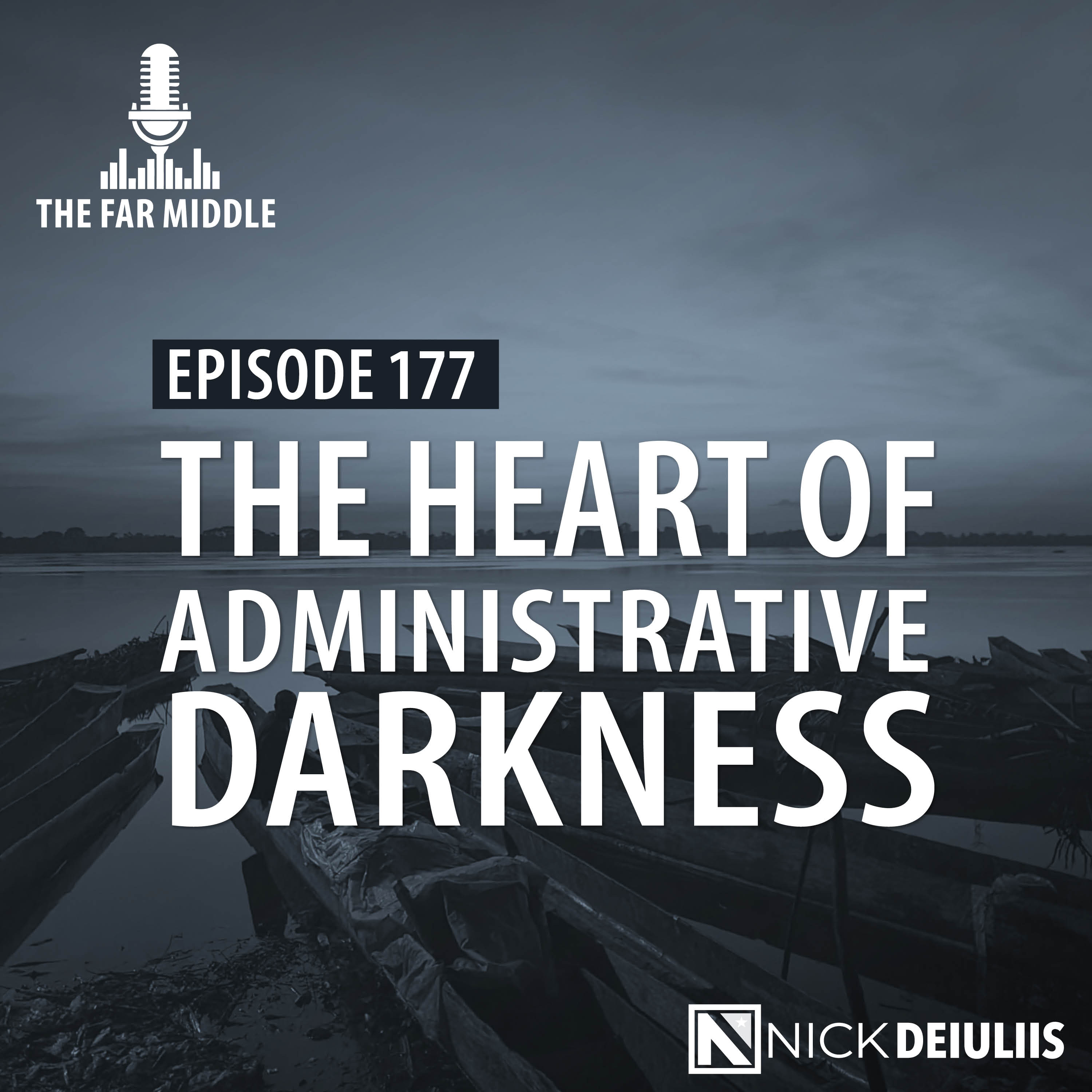
In Far Middle episode 177, Nick begins by wishing Jewish friends and listeners a thoughtful upcoming Yom Kippur and best wishes for the new year. Nick then proceeds to examine a series of interconnected yet seemingly unrelated topics in classic Far Middle fashion. In one of the more unique sports dedications, Nick offers a tribute to actor Burt Young, best known for his role as Paulie in the Rocky films. Young, who passed away a year ago yesterday, had a brief but successful professional boxing career before becoming an actor. He trained under legendary boxing coach Cus D'Amato and acting teacher Lee Strasberg, and in addition to Rocky, appeared in classic films like Chinatown and Once Upon a Time in America. Nick next delves into government and administrative intervention in the private sector, highlighting three examples: In California, Google recently struck a $180 million deal with the state to fund government-backed news organizations. This arrangement raises concerns about the independence of journalism and the potential for news outlets to become mouthpieces for government interests. In New York, the state has agreed to pay exorbitant prices for electricity from offshore wind farms, potentially burdening taxpayers and ratepayers. The agreed-upon prices are significantly higher than estimated breakeven costs, raising questions about the economic viability of these projects. Nick then examines numerous legal defeats suffered by federal agencies like the FCC, EPA, and SEC as courts have ruled against their attempts to expand regulatory power without proper authority. These cases highlight the “covert but serious campaign going on when it comes to the administrative state looking to expand its power and authority,” says Nick. “This behavior by the administrative state is lawlessness…the administrative state intends to disregard the law as it seeks to impose its will on the citizens of this country without any authority or consent from the governed. The best term for that is indeed lawlessness.” Nick closes by connecting the episode’s discussion to English novelist Joseph Conrad, who died a century ago this past August. Conrad's writings, particularly "Heart of Darkness," explored the dark side of human nature and challenged notions of progress. Nick draws parallels between Conrad's critiques of colonialism and modern concerns about government overreach and unintended consequences of well-intentioned policies. “Don't be too eager or easily swayed when it comes to government or bureaucratic promises of saving the planet, furthering education, or helping the downtrodden through state control. The actual results may make things much worse,” concludes Nick.
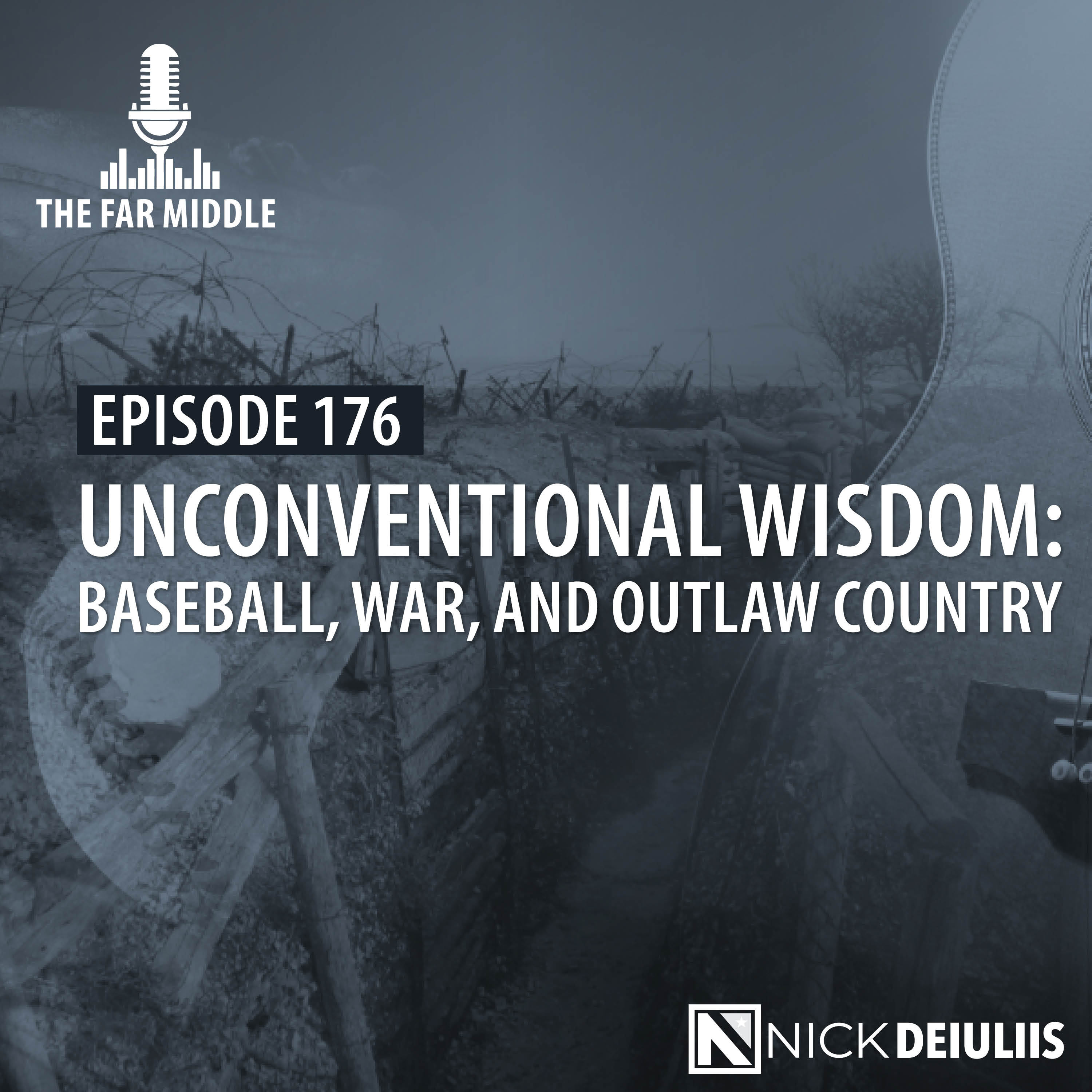
In Far Middle episode 176, baseball great Willie Mays makes a series encore appearance in conjunction with the episode’s sports dedication. While Mays was honored in episode 24, it’s an interview Mays gave in 1954 that’s the focus of this installment. In that interview, Mays revealed his mindset as a professional athlete in the 1950s, which included emphasizing the importance of loving the game, living a clean life, and getting the right amount of sleep. He believed in learning through experience and developing one's own style, as evidenced by his unconventional "basket catch" technique. Mays' approach demonstrated confidence and self-assurance that led to excellence. Next, Nick connects “to another example of self-confidence and self-assurance, but in this instance leading to epic — and I mean epic — human suffering and historical tragedy.” He proceeds to examine Adolf Hitler's experiences during World War I. Those experiences shaped Hitler’s self-assured and often arrogant approach to military strategy in World War II. Hitler's front-line experiences as a messenger in the trenches gave him a sense of superiority over his generals, whom he viewed as detached from the realities of war. This confidence in his judgment, stemming from his firsthand war experiences, tragically contributed to his disastrous military decisions in World War II. “Sometimes the greatest among us, and the worst of the human species, they share some things in common,” says Nick. “And understanding the nature of that overlap, I think it can help us fortify the greatest and avoid the worst.” Continuing to discuss the thin line between genius and madness, Nick examines a third and final connection: Billy Joe Shaver. A founding father of outlaw country music, Shaver's unconventional path to success included overcoming personal setbacks, such as losing parts of two fingers in a lumber mill accident. Shaver’s unique songwriting style and independent spirit helped birth the outlaw country genre. However, his non-conformist attitude also had a darker side, as evidenced by a shooting incident in 2007, for which he was later acquitted. Nick concludes by emphasizing the importance of maintaining a moral compass while being self-confident and challenging conventional wisdom. The episode’s three seemingly unrelated figures illustrate how similar traits can lead to vastly different outcomes, from greatness to tragedy.
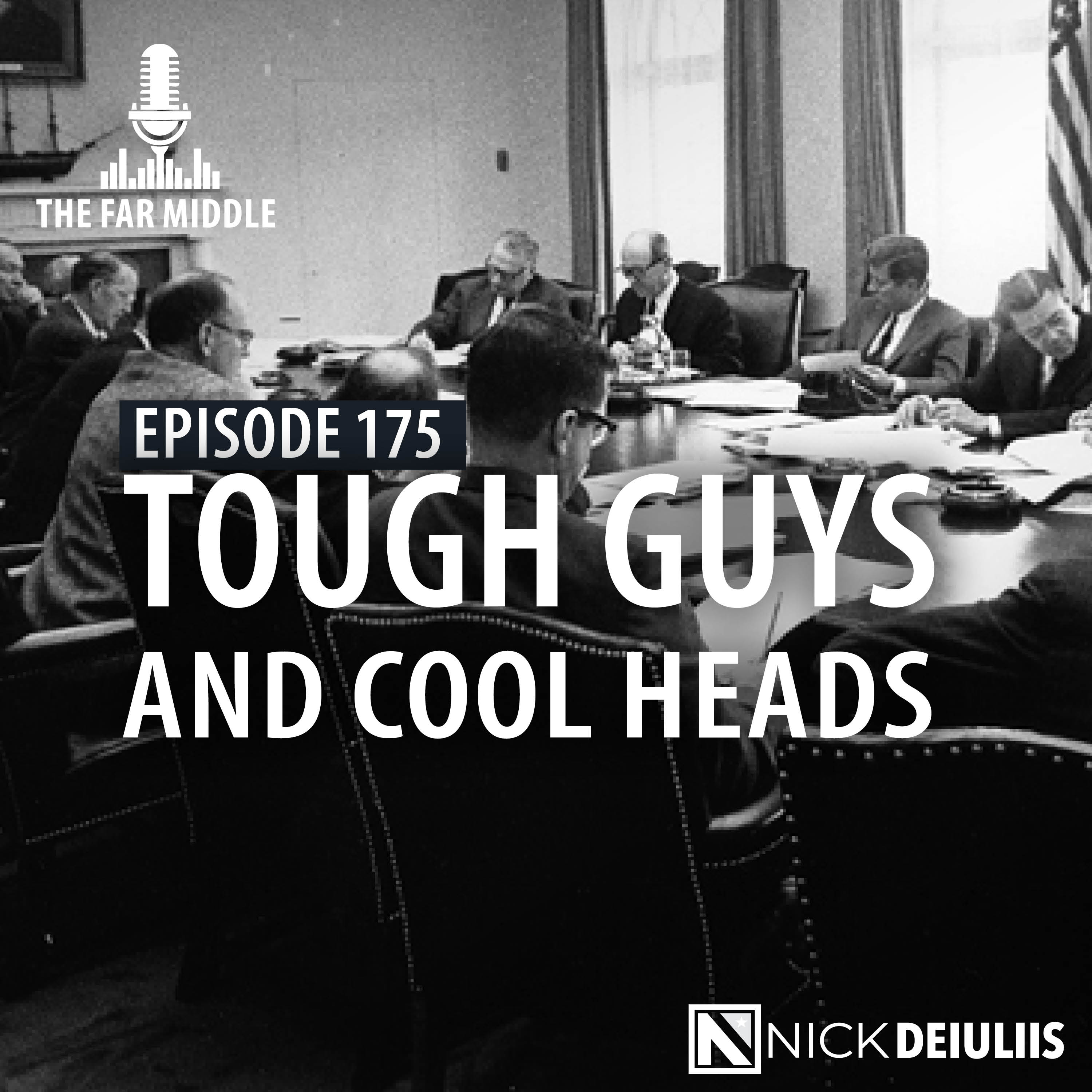
Far Middle episode 175 returns to the rink with a tribute to Bob Probert for this week’s sports dedication. Probert is widely considered the greatest hockey enforcer in NHL history and could play both ends of the ice, scoring 20 to 30 goals per season. “Probie” played primarily for the Detroit Red Wings and was known for his intimidating presence—tallying 232 fights and 3,300 penalty minutes over 16 NHL seasons. Nick calls Probert “the greatest of a dying, and perhaps already dead, breed.” Drawing a parallel from Probert's role as a deterrent on the ice, Nick connects to the concept of nuclear deterrence, continuing prior episode 174’s look at the importance of missile defense in our unstable world of multiple nuclear capable adversaries. Specifically, Nick examines the Cuban Missile Crisis of 1962, referencing Robert F. Kennedy's book "Thirteen Days." Learning lessons from those 13 days in October 1962 are “of vital importance today because with multiple threats facing the West—China, Russia, Iran and North Korea—decision making in geopolitical crises that involve nuclear powers may need to become much more process-driven versus individualistic or ego-driven,” says Nick. Analyzing the crisis management by President Kennedy and his executive committee (EXCOMM), Nick emphasizes the importance of structured decision-making and time management in high-stakes geopolitical situations. And he explores the three "velocities" at play during the crisis: the velocity of Russian initiative, the velocity of American response, and the velocity of assessing and deciding a course of action. “Recognizing and organizing a process and subsequent decisions into different components, that's going to be crucial to managing a rational process during time of tension,” says Nick. Nick then examines how nuclear deterrence strategies have evolved since 1962, comparing the velocities of events, response, and decision-making between then and now. Missile defense systems like "Star Wars" or Iron Dome are just as important today as in the 1980s, not just for their defensive capabilities but also for their ability to buy crucial time for decision-making during crises. Rational, process-driven leadership in handling modern geopolitical tensions is critical. Our complex global landscape requires leaders who prioritize optimal outcomes over personal legacy or popularity. In closing, Nick connects to the Mad Max series and Tina Turner's hit song "We Don't Need Another Hero" from Mad Max Beyond Thunderdome. The film’s post-apocalyptic world and the potential consequences of nuclear conflict, alongside the song's lyrics, further emphasize the importance of getting America’s nuclear deterrence strategy and tactics right in today’s world.
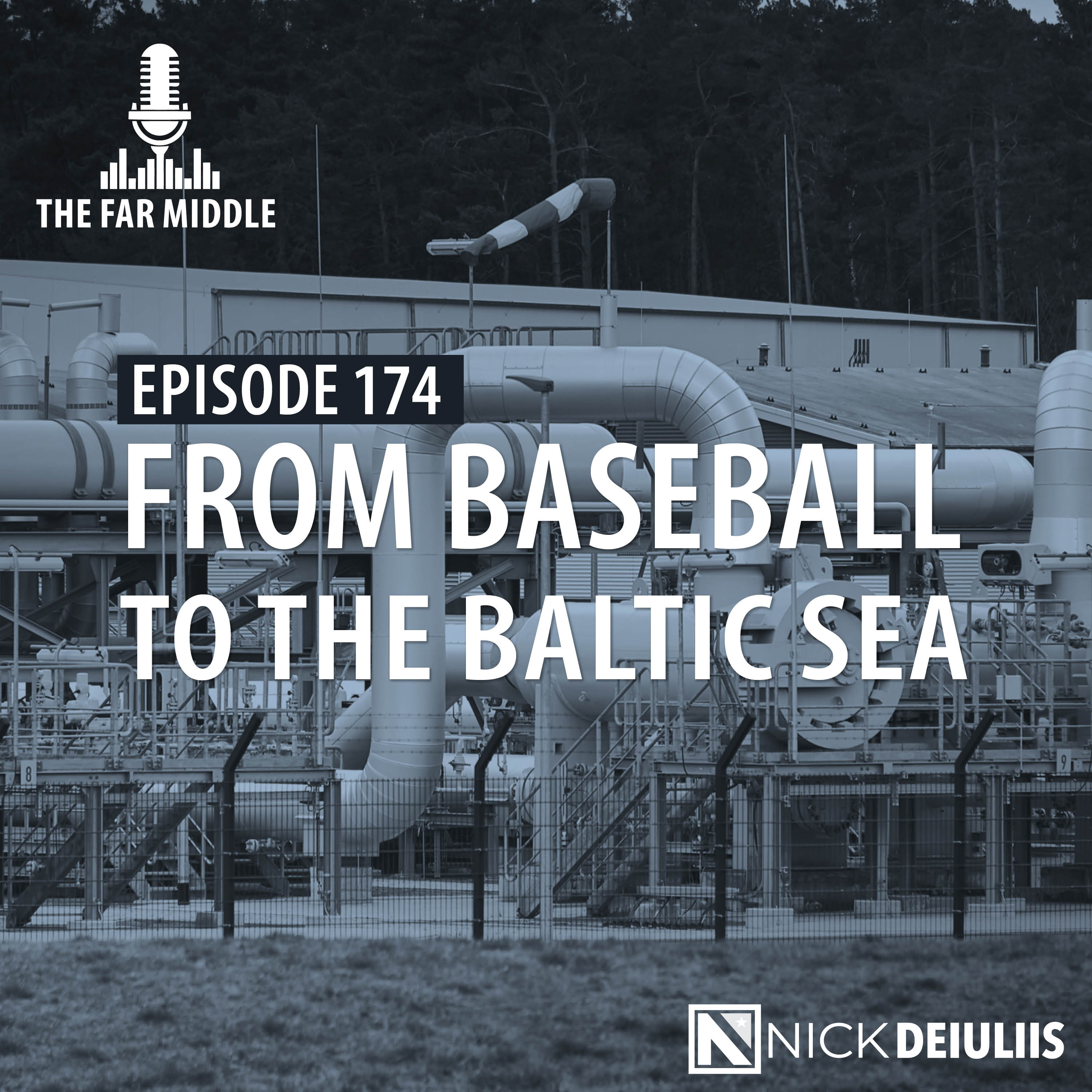
In Far Middle episode 174, Nick leads off by acknowledging Constitution Day and its significance. Next up, the episode’s September 18, 2024, release date coincides with the 30th anniversary of the premiere of Ken Burns' 1994 Baseball documentary. Nick celebrates Burns’ Emmy-winning series for this week’s sports dedication, calling it the greatest sports documentary ever made. Burns’ only error? Compressing the 1970 to 1992 period into one episode. Leaving the baseball field, Nick then dedicates the bulk of the episode to a detailed account of the Nord Stream pipeline sabotage that occurred in September 2022. That sabotage represents a “sequence of events that are right out of a spy novel or suspense movie that deserve a documentary of its own,” says Nick. Nick presents a fascinating examination of the Nord Stream pipeline attack, describing how the plan allegedly originated in a Ukrainian bar in May 2022. He recounts how a small team of Ukrainian military officers and civilians carried out the operation using a rented yacht, with skilled divers planting explosives on the pipeline. Beyond the operation’s details, Nick also discusses the geopolitical implications of the sabotage and the reactions of various countries, including Germany, Russia, Poland, and the United States. He explores the evidence pointing to Ukrainian involvement, while also noting the official denials issued by Ukrainian authorities. Nick emphasizes the significant economic and political repercussions of the attack, particularly for Germany. Transitioning from this spy-thriller-like story, Nick stays in the arena of foreign policy and national defense. He connects to America’s nuclear strategy, arguing a nuclear deterrence strategy may no longer be effective against modern adversaries like China, Russia, Iran, and North Korea. “Nuclear deterrence, to work, requires mutual, rational thinking from both sides, not just us,” says Nick. “And I don't think assuming our enemies will apply such thinking is a safe assumption these days. Pursuing a modern Strategic Defense Initiative by employing interceptors, that would strengthen America's hand to coerce those adversaries into submission and ultimately to call their bluffs. Climate change is not anything close to our biggest threat these days. Let's wake up and look around the map.” Nick concludes by noting we need to remain vigilant all along the watchtower when it comes to nuclear threat, which provides a fitting closing connection to episode 174’s release date to reflect on Jimi Hendrix and his much-too-early death at age 27 on September 18, 1970, “one of the greatest extinguished.” Give a listen for Nick’s favorite Hendrix song, and see where Hendrix ranks on Nick’s list of The Ten Greatest Guitarists in Rock History.
Discover new partners and
collaboration opportunities —right in your inbox.
Get notified about new partnerships